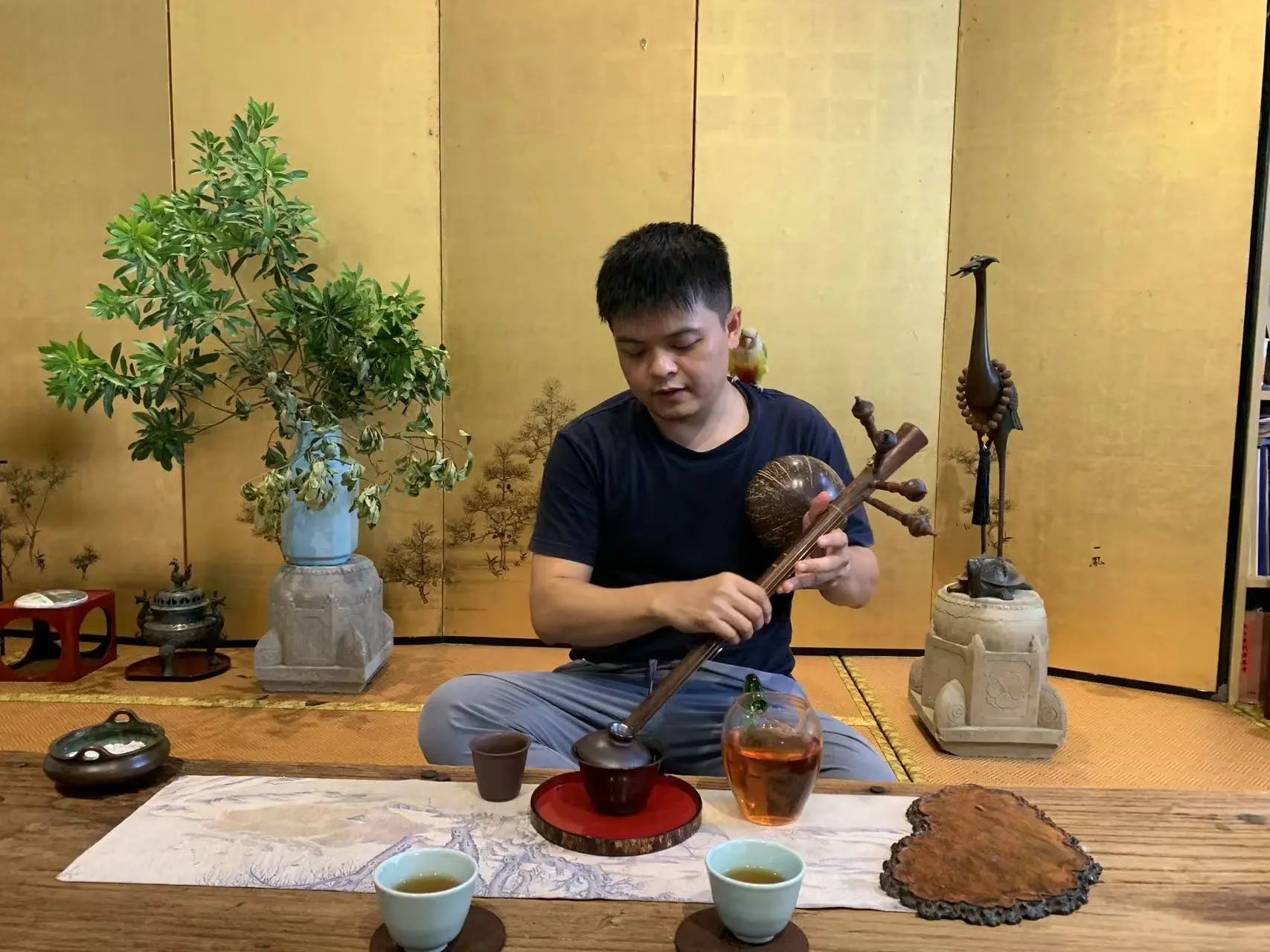
Wei Qingbing receiving our interview
NANNING, Aug. 15 (Xinhua) -- A duxianqin musician only needs a single string stretched across an elongated sounding board and a feather-shaped rod to deliver a diverse repertoire, whether pop or classic, Chinese or Western.
In his folding screen-adorned Zen-style studio, Wei Qingbing, 39, sat on the bamboo-mat-paved floor and plucked the string on his duxianqin -- literally "a single-stringed zither" -- with his right hand, in a vivid rendering of a melodic tune, his left hand sliding across the rod to heighten or lower the pitch and add vibrato to the note.
"Did you make this instrument yourself?" Since he first uploaded clips of him playing the single-stringed zither onto the popular social media platform Douyin in 2018, Wei, a freelance teacher and a PhD student of music who lives in Nanning City of Guangxi Zhuang Autonomous Region, has received many comments.
For a fairly large proportion of his over 150,000 followers, Wei's clips are the first time they have seen a duxianqin performance.
Some of his followers are happy to answer any newcomer's questions, commenting that the duxianqin zither is a traditional instrument of the Jing ethnic group.
As one of China's smallest minority groups, the Jing currently number less than 30,000 and mainly live in Guangxi's border regions adjoining Vietnam, where the duxianqin is also played.
Wei made this otherwise-anonymous instrument known to a wider audience in China through social media platforms.
Wei himself identifies as Zhuang, another ethnic group inhabiting Guangxi famed for their singing tradition. He stumbled across the novel-looking duxianqin back in high school when watching a traditional music band perform on TV. He was hooked.
After being admitted to college, he began to learn duxianqin from various teachers, including the Jing people and maestros from Vietnam.
The art of duxianqin was formally recognized by the Chinese government as a piece of intangible cultural heritage in 2011, and Wei was named an inheritor of duxianqin for his proficiency in 2021.
After gaining recognition, Wei was sought out by people who aspire to learn the instrument, ranging from school kids to pensioners.
Xu Jing, a small business owner in Nanning, took her 8-year-old son to Wei's studio for duxianqin tutoring. Speaking of her choice of the instrument for her son, Xu said, "I think it would be a pity if a kid in Guangxi does not play a folk instrument. Moreover, there are already too many students learning Western instruments."
"Duxianqin looks very special," said Xu, believing that the country's support for traditional instruments will benefit learners like her son.
For Wei, his love of folk instruments is not limited to duxianqin, but encompasses plucked-string instruments from China and southeastern Asian countries.
In his studio, several guqin zithers, a seven-stringed classical Chinese instrument, are placed on the bamboo-mat floor or the antiquity-style furniture, and a Thai folk instrument, the Pin Pia, hung on the wall, amid tea cups and a variety of tea pots.
Wei integrates his love for traditional culture into his life. Not only does his studio exude classical Chinese elegance, but he also retreats to a serene place tucked away in mountains every week. He brings his guqin zithers with him and plays them by rivers or waterfalls, all filmed and posted on his social media account, attracting envious viewers.
"Modern life is fast-paced, and playing the guqin quietens noisy minds," said Wei.
In his studio, Wei pulled out a volume of ancient guqin scores from a shelf and opened it, pointing with his index finger at the bizarre-looking characters, saying the ancient guqin scores feature only technique instructions for each note, but lack a well-defined pitch, rhythm or strength. "That leaves musicians space to improvise," said Wei.
Ancient China emphasized the concept of "Heaven and Man as One," and playing the guqin requires performers to play music according to their state of mind, according to Wei.
For the same degree of artistic freedom, he loves other folk instruments as well. "The performance of Western musical instruments strives for perfection, with no room for errors and the rhythm must be precise. In contrast, the duxianqin and most ancient Chinese and Asian zithers allow ample room for performers to freely express themselves," said Wei.
"I really enjoy the freedom to improvise, it's interesting," he said. Enditem
The author is Xinhua writer Tian Ying. Guo Bingqian, Wu Xinni, Feng Shiqi, Liu Jie, Zhang Qingshuo, Li Weixin, Shi Peng and Zhong Yi also contributed to the story.

 |Hongkou Campus|550 Dalian Road (W), Shanghai 200083, China |Songjiang Campus|1550 Wenxiang Road, Shanghai 201620, China
|Hongkou Campus|550 Dalian Road (W), Shanghai 200083, China |Songjiang Campus|1550 Wenxiang Road, Shanghai 201620, China